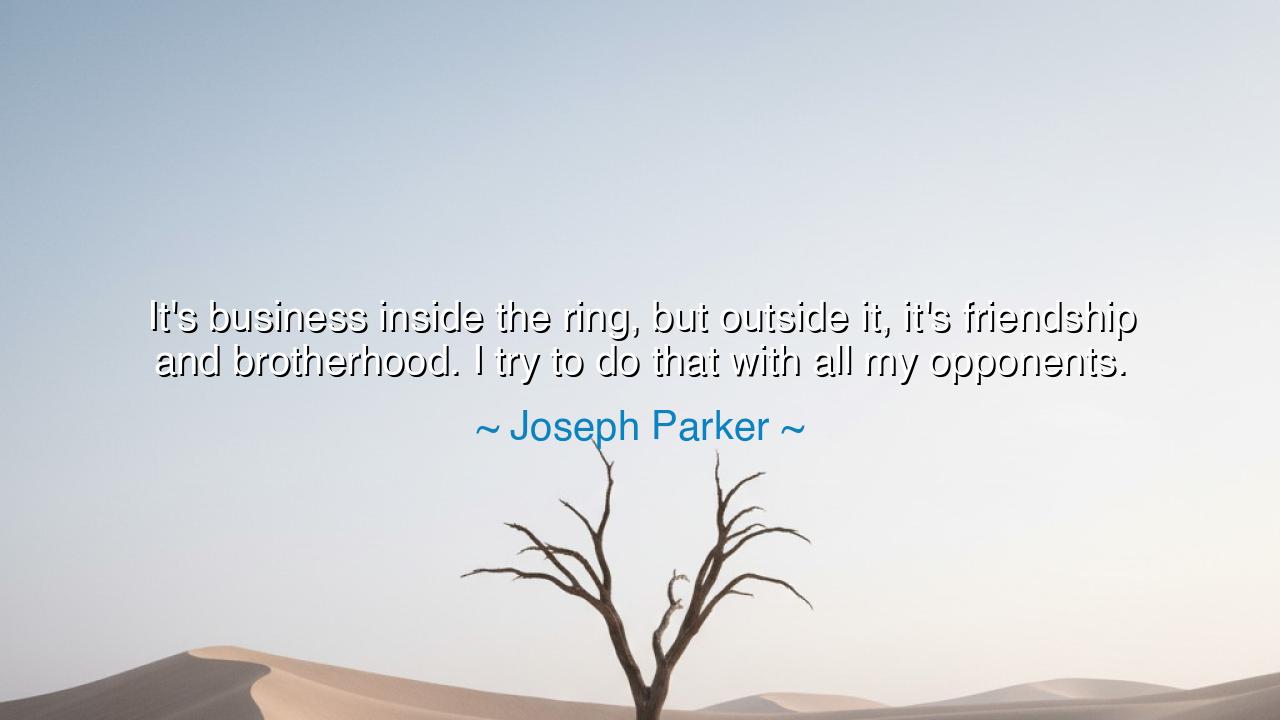
It's business inside the ring, but outside it, it's friendship
It's business inside the ring, but outside it, it's friendship and brotherhood. I try to do that with all my opponents.






In the ancient world, where warriors of great renown clashed on the battlefield, there was an unspoken understanding that, while the heat of battle might drive them to fight with every ounce of their strength, once the swords were lowered and the dust had settled, respect and honor prevailed. Joseph Parker, a modern warrior of the boxing ring, echoes this sentiment when he says, "It's business inside the ring, but outside it, it's friendship and brotherhood. I try to do that with all my opponents." These words ring true across time, calling to mind the ancient heroes who understood that the line between competition and comradeship is a fine one, and that the greatest victories are those achieved not in isolation, but in the shared respect for one another’s strength and courage.
To understand the depth of Parker's words, we must first recognize that competition, in its highest form, is not about conquest but about the mutual growth that comes through facing an equal. The ancient Greeks, who gave rise to the first Olympic Games, celebrated the athletic contest as a means to honor the gods, but also as a way to unite men in common pursuit. They understood that to compete was to test one's limits, but to do so with respect for one's opponent. As the philosopher Aristotle said, "The highest form of friendship is one based on a shared pursuit of virtue." So too is Parker's approach to his sport—a recognition that while the ring is a place of fierce competition, it is also a place where the virtues of courage, honor, and respect are tested and celebrated.
In battle, whether fought in the arena or on the field, there is always a tension between the urge to dominate and the desire for honorable connection. Alexander the Great, perhaps one of the most famous conquerors in history, understood this deeply. After his triumphs, he often sought to unite the cultures of the lands he conquered, not by subjugation, but by forging alliances and promoting brotherhood between his soldiers and the peoples they had defeated. He knew that true strength lies not in division, but in the ability to form bonds that transcend the battlefield. Parker, too, recognizes this balance—within the ring, there is business and fierce competition, but outside it, there is brotherhood and mutual respect.
The idea that business and friendship can coexist in the world of combat might seem paradoxical, yet it is a lesson taught throughout history. In the ancient Roman legions, soldiers were often called to fight alongside men from distant lands, men who were once their enemies. Yet, through the rigors of battle, they forged brotherhoods that endured beyond the walls of war. These soldiers, bound not by shared ancestry but by their honor and commitment, came to understand that the strength of their legions was not only in their military prowess but in their ability to treat their comrades with respect and unity, even after the battle was won.
Similarly, Parker embodies this ancient principle in the boxing ring, where the fiercest of competitors can also be the truest of friends. Friendship in combat, like the friendships between ancient warriors, is a bond forged in the fires of shared struggle, one that transcends the moment of competition. In this way, the ring becomes a place not of enmity, but of mutual growth—where each fighter, through facing one another, uplifts both themselves and their opponent. It is through this mutual respect that the true meaning of victory is found—not in the defeat of the opponent, but in the personal growth that comes from the test of will, the test of strength, and the respect earned through shared endeavor.
The lesson, then, is one of balance—the understanding that competition and friendship need not be opposing forces. Whether in sports, business, or personal relationships, we often find ourselves in situations where we must choose between advancement and cooperation, between self-interest and the greater good. But the truth, as exemplified by Parker, is that these two forces need not be in conflict. In fact, the highest form of success comes not through rivalry alone, but through collaboration and respect, even in the fiercest of competitions.
So, let us take this wisdom into our own lives. In every challenge we face, let us remember that the greatest victories are those we achieve together. Whether it is in our workplaces, communities, or personal relationships, let us strive to see the humanity in those we compete against, knowing that true strength lies not in domination, but in the bonds of respect and brotherhood we form. Let us approach every battle, not with the goal of defeating our opponents, but with the aim of elevating both ourselves and those around us—knowing that in friendship, we find the true meaning of victory.






AAdministratorAdministrator
Welcome, honored guests. Please leave a comment, we will respond soon